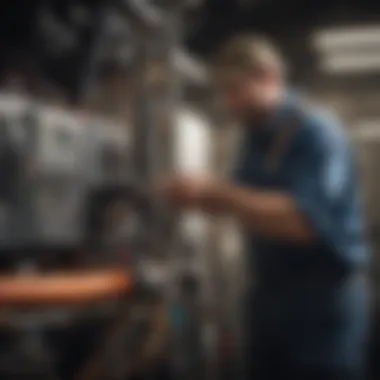Understanding Wages for HVAC Service Technicians


Intro
The wages of HVAC service technicians represent a crucial aspect of the industry, drawing interest from various stakeholders. Understanding the structure of these wages is essential for several groups: aspiring technicians curious about potential earnings, industry leaders evaluating compensation trends, and policy thinkers assessing the workforce's economic health.
The HVAC field is multifaceted, influenced by various factors such as regional market conditions, levels of demand, and necessary certifications. With climate control becoming increasingly important in both residential and commercial spaces, the need for skilled technicians is on the rise. As these dynamics evolve, so too do the compensation packages that reflect the value of this vital trade.
In this article, we will explore:
- The key factors impacting HVAC technician wages.
- The role of certification and training.
- The significance of regional disparities in pay.
- Current industry demand and its effects on salaries.
- The importance of continuous education and skill development in enhancing earning potential.
With a thorough analysis of these themes, we aim to provide a comprehensive view of the financial landscape for HVAC service technicians.
Prolusion to HVAC Service Technicians
Understanding the role of HVAC service technicians in today’s economy is crucial for both prospective technicians and industry stakeholders. As technology in climate control systems evolves, these technicians are becoming an indispensable part of residential and commercial sectors. Their expertise in heating, ventilation, and air conditioning affects daily living and working conditions directly. Thus, exploring their wages is not just a financial concern but also a reflection of the industry’s demand for skilled labor and the complexities tied to climate control technologies.
Defining HVAC Service Technicians
HVAC service technicians are professionals trained to install, maintain, and repair heating, ventilation, and air conditioning systems. They work across various environments, from residential homes to large commercial properties. Their responsibilities include troubleshooting system issues, performing routine maintenance, and ensuring compliance with safety regulations. A clear understanding of what it means to be an HVAC technician provides insight into the skills required and the investment in training necessary for a successful career.
Role and Responsibilities
The role of HVAC service technicians extends beyond mere installation and repair. Their responsibilities can be categorized into three main areas:
- Installation: Technicians are responsible for setting up new HVAC equipment. This involves understanding system requirements and ensuring proper connections are made.
- Maintenance: Routine checks are vital for the efficient operation of HVAC systems. Technicians must conduct regular maintenance like filter changes, system cleaning, and seasonal inspections.
- Repairs: Diagnosing issues is a critical part of the job. Technicians use problem-solving skills to identify malfunctions and apply the appropriate fixes.
"HVAC technicians not only maintain comfort but also contribute to energy efficiency and environmental considerations in their work."
In addition to these technical duties, HVAC service technicians are often called upon to educate customers about system efficiency, helping them to make informed choices regarding upgrades or repairs. This educational role reflects a growing trend in the industry where technicians are not just service providers but also consultants in climate control solutions.
Recognizing the multifaceted nature of HVAC service technicians is vital for understanding their wages. As their responsibilities grow more complex, so too does the value they bring to the industry.
Overview of HVAC Industry Trends
Understanding the HVAC industry trends is crucial for those involved in this sector, especially for current and aspiring HVAC service technicians. Keeping track of these trends helps technicians align their skills with market demands and enhances their worth in a competitive field. The shifts in industry practices, driven by various factors, can significantly affect employment opportunities and wage structures. It is also essential for stakeholders to comprehend these trends for making informed business decisions.
Growth of the HVAC Sector
The growth of the HVAC sector can be attributed to increasing urbanization, rising temperatures, and a heightened emphasis on energy efficiency. According to multiple industry reports, the HVAC market is projected to expand steadily over the next few years. More restrctions on energy consumption and sustainability initiatives have prompted both residential and commercial sectors to invest in advanced HVAC systems.
Technicians with up-to-date skills are more valuable in this landscape. Employers often look for those who can install and maintain smart HVAC systems that integrate with IoT technologies. This increase in demand for skilled labor has led to competitive wages, and those who specialize in high-demand areas can expect even higher compensation. The U.S. Bureau of Labor Statistics reported a notable uptick in job openings for HVAC technicians, indicating a solid job outlook moving forward.
Technological Advancements
Technological progress in HVAC systems has been significant. Innovations such as variable refrigerant flow systems and smart thermostats have changed how HVAC professionals operate. Technicians must now be adept at working with complex systems that often require specialized knowledge.


Staying current with technology not only enhances a technician's employability but also plays a role in wage negotiation. As the industry evolves, there is an increasing expectation for technicians to have familiarity with automated systems and environmentally friendly technologies. Continuous education and certification in these areas can lead to higher wages.
Factors Influencing HVAC Wages
The wages for HVAC service technicians are not a fixed number. Instead, they vary significantly based on several factors that play a crucial role in determining salary structures. Understanding these factors is essential for both current professionals and those considering entering the HVAC field. This knowledge not only helps in salary negotiations but also guides career choices and specialization in the industry.
Geographical Location
Geographical location is one of the most significant factors affecting HVAC wages. Different regions have different costs of living, which in turn influence salary levels. For example, a technician working in large urban areas like New York City or San Francisco may earn a higher wage compared to someone in a rural area. This disparity occurs due to the higher demand for HVAC services in densely populated areas where more buildings, both residential and commercial, require climate control systems.
In addition, regional climates can affect the demand for HVAC technicians. For instance, warmer states such as Florida or Arizona may experience more demand for air conditioning services, boosting wages in those areas. Conversely, colder regions may see higher demand for heating services during winter months.
Experience Level
Experience level is another key determinant of HVAC technician wages. Generally, the more experience a technician has, the higher their earning potential. Newly trained technicians often start at entry-level wages. As they gain hands-on experience, they can advance to higher-paying positions.
Experienced technicians have usually developed a wider range of skills. This includes troubleshooting complex systems and performing specialized installations. Additionally, those who take on supervisory or management roles typically earn more due to increased responsibilities. Employers often reward experienced technicians not just with higher wages, but also with more comprehensive benefits packages.
Specialization within HVAC
Specialization can also significantly influence earnings in the HVAC field. Service technicians who focus on specific areas, such as refrigeration, installation of smart HVAC systems, or renewable energy systems, may command higher salaries. Specialized skills are in high demand, especially as the industry evolves with new technologies and environmental considerations.
Having certifications in niche areas can further enhance a technician’s marketability and financial prospects. For example, technicians skilled in the installation and maintenance of advanced heat pump systems may find more lucrative job opportunities compared to general technicians.
Employing both a geographical understanding and focusing on one's specialty can lead to substantially higher wages in the HVAC industry.
In summary, HVAC wages are influenced by a multitude of factors. Geographical location, experience level, and specialization all play pivotal roles in shaping earning potential. A comprehensive understanding of these elements can empower technicians to make informed decisions about their careers.
Average Wage Estimates
Understanding average wage estimates for HVAC service technicians is fundamental for anyone considering a career in this sector. These estimates provide insight into the financial rewards of the profession and highlight the various factors affecting earnings. Knowing the average wages helps potential technicians make informed decisions regarding their education and career path. It also serves as a crucial tool for employers in structuring competitive salaries to attract and retain skilled workers.
National Average Salaries
The national average salary for HVAC service technicians varies based on numerous factors, including experience, location, and specific certifications. According to recent data, the average salary hovers around $50,000 per year. However, this figure can rise significantly for those with more experience or specialized skills.
Experience plays a crucial role. Technicians with several years in the field often earn upwards of $70,000. For new entrants, starting salaries typically range from $32,000 to $40,000. Moreover, certifications such as those from the Environmental Protection Agency (EPA) or the North American Technician Excellence (NATE) can influence salary, often leading to higher pay grades.
"Having the right certifications often gives technicians a significant edge in salary negotiations."
Comparative Analysis by Region
Geographical location significantly impacts HVAC service technicians' salaries. For instance, technicians based in metropolitan areas tend to earn more compared to their rural counterparts. States such as California, New York, and Texas often report higher average salaries due to the cost of living and increased demand for HVAC services.
Consider the following salary averages by region:
- West Coast (e.g., California): Average salary is around $60,000.
- Northeast (e.g., New York): Average salary is about $55,000.
- Midwest (e.g., Illinois): Average salary typically sits around $48,000.
- South (e.g., Texas): Average salary often reaches about $50,000.
- Southeast (e.g., Florida): Average salary is roughly $45,000.


These regional differences reveal how local economies and demand for HVAC services shape salary structures in this industry. For aspiring technicians, recognizing these variations can be critical in planning their careers.
Impact of Certifications on Wages
Certifications play a significant role in the HVAC industry, greatly influencing wages for technicians. They serve as a benchmark to demonstrate expertise and commitment to ongoing professional development. As the demand for skilled HVAC service technicians rises, the importance of recognized certifications has become even more pronounced. Employers often seek candidates who have specific qualifications, which can lead to better job prospects and higher salaries. In this section, we will explore the common HVAC certifications and their impact on earnings.
Common HVAC Certifications
Several certifications within the HVAC field can enhance a technician's career. Some of the most recognized include:
- EPA Section 608 Certification: Essential for those who work with refrigerants, this certification ensures compliance with federal regulations.
- NATE Certification: North American Technician Excellence offers this widely acknowledged credential, which evaluates technician knowledge and skills across various aspects of HVAC.
- HVAC Excellence Certification: This program is designed to enhance the skills of technicians and improve their abilities to perform essential job functions.
- R-410A Certification: Focused on understanding and handling R-410A refrigerant, this certification is critical due to its increasing use in modern HVAC systems.
These certifications not only validate technical skills but also signify a higher level of professionalism, thereby attracting employers seeking reliable workers.
Certification Impact on Earnings
Holding relevant HVAC certifications generally correlates with higher earnings. Technicians with certifications tend to command higher hourly wages compared to their uncertified peers. For instance, individuals with NATE Certification often report earning up to 10% more than those without it. This can be attributed to several factors:
- Increased Job Opportunities: Certified technicians often have access to a broader range of job openings. Many employers prefer or even require specific certifications when hiring.
- Higher Pay Potential: Certifications can contribute to wage increases during promotions or when negotiating new salary terms. Employers recognize the value that certified individuals bring to the table.
- Demonstrated Expertise: Holding certifications provides proof of a technician’s ability, which enhances their credibility and can justify higher pay.
"Certifications provide a clear signal of competency in a competitive job market."
Continuous education and earning certifications is essential in the HVAC field. As technologies evolve and new systems are introduced, certifications ensure technicians remain up-to-date. This dynamic reinforces the correlation between education and enhanced job performance, likely leading to better wages in the long run.
Job Outlook for HVAC Technicians
The job outlook for HVAC technicians holds significant relevance within the context of this article. Understanding the future landscape of employment opportunities is essential for both aspiring technicians and industry stakeholders. The demand for skilled labor in the HVAC field is expected to grow for various reasons, and several factors contribute to this trend.
Employment Growth Projections
Employment growth projections for HVAC technicians continue to present a positive outlook. According to the U.S. Bureau of Labor Statistics, the employment of heating, air conditioning, and refrigeration mechanics and installers is expected to grow by about 5 percent from 2021 to 2031. This growth is largely driven by the increased need for energy-efficient and environmentally friendly HVAC systems. As buildings require more complex installations and maintenance, technicians will play a crucial role in ensuring these systems operate effectively.
Advancements in technology also influence these projections. Newer systems often require technicians to have updated skills, making continued education and training vital. Important areas of growth include:
- Smart HVAC systems: As smart technology grows in popularity, technicians will need to adapt and learn how to install and repair these sophisticated units.
- Energy efficiency: The emphasis on reducing energy consumption leads to higher demand for HVAC specialists who can implement energy-efficient solutions.
- Infrastructure aging: Many existing HVAC systems are reaching the end of their lifespan, leading to increased replacements.
In addition, local and state governments often incentivize the installation of modern systems. Hence, job security appears favorable for those entering this field.
Demand for Skilled Technicians
The demand for skilled technicians in HVAC is not only a trend but a necessity. Several factors underscore this demand:
- Population Growth: As populations increase, so does the number of residential, commercial, and industrial buildings requiring HVAC services.
- Regulatory Requirements: Stricter regulations on emissions and energy efficiency mean that more buildings will need to upgrade existing HVAC systems. This translates into more job opportunities for technicians with specialized training.
- Seasonal Workloads: HVAC systems require maintenance and repair throughout the year. The seasonal nature of heating and cooling needs creates a consistent demand for skilled professionals during peak periods.
- Retirement of Current Workforce: A significant portion of the current HVAC workforce is nearing retirement age, leading to a potential skills gap. New technicians entering the field will be crucial to fill these positions.
Benefits and Incentives


Understanding benefits and incentives is crucial for HVAC service technicians as they can significantly enhance the overall compensation package beyond the base salary. Both standard benefits and performance-based incentives play a vital role in determining job satisfaction, retention rates, and the overall appeal of career choices within the HVAC sector. Companies that offer robust benefits are often more attractive to skilled workers in a competitive job market, where talent acquisition is key to business success.
Standard Benefits in HVAC Jobs
Standard benefits for HVAC service technicians typically include:
- Health insurance: A primary consideration for many individuals. Coverage may extend to family members, which adds value to the overall package.
- Retirement plans: Options like 401(k) plans can help technicians prepare for the future. Employer contributions often enhance the appeal of these plans.
- Paid time off: Vacation days, sick leave, and personal days contribute to better work-life balance. This is especially important in a physically demanding job.
- Training and development: Many employers support continuing education and certification. This not only benefits technicians by advancing their skills but also helps companies retain talent and ensure quality service.
It’s clear that these benefits play a role in attracting and retaining HVAC professionals. Businesses that prioritize employee welfare often see reduced turnover, leading to long-term savings on hiring and training new staff.
Performance Bonuses
Performance bonuses provide an additional layer of financial incentive for HVAC technicians. Typically linked to individual or team performance, these bonuses can motivate technicians to improve efficiency and service quality. Here are some factors that often influence the allocation of performance bonuses:
- Sales goals: Many HVAC technicians are involved in selling services or products, such as maintenance contracts. Meeting or exceeding sales targets can trigger bonuses.
- Customer satisfaction: Companies may offer bonuses based on customer feedback. High-quality service often results in positive reviews and repeat business, which may reward technicians for their efforts.
- Project completion: Bonuses for completing projects ahead of schedule or under budget can encourage technicians to maintain high productivity and workmanship.
In summary, performance bonuses serve as an effective way to incentivize HVAC service technicians. When combined with standard benefits, these incentives create a more attractive compensation framework, driving motivation and promoting excellence in the workplace.
Challenges Facing HVAC Technicians
The HVAC industry is intricate and constantly evolving. In the competitive landscape, technicians face several challenges that can affect their wages, job satisfaction, and overall career trajectory. Understanding these challenges is critical for aspiring technicians and industry stakeholders. This section explores the primary difficulties that HVAC technicians encounter, focusing on industry competition, wage pressure, and work-life balance considerations.
Industry Competition and Wage Pressure
The HVAC sector has seen significant growth. However, this growth brings increased competition. Many new entrants are joining the field, leading to a saturation of the market. Established technicians may feel pressure to lower their rates to remain competitive, which can impact overall wage levels. Moreover, companies often compete on price, which can further squeeze technicians’ earnings.
Technicians possessing advanced skills or certifications can command higher wages. Nevertheless, without these qualifications, standing out among numerous candidates can be challenging. Technicians must continuously seek to improve their skills through education and training. Rising costs of living in certain areas push technicians to seek better-paying opportunities, increasing turnover and instability within companies.
Managers and employers might respond to these pressures by cutting costs on wages and benefits, resulting in ongoing wage pressure for HVAC professionals. "Only skilled workers will prevail, while others struggle to survive in the competitive arena."
Work-Life Balance Considerations
Work-life balance is a significant concern for HVAC technicians. The nature of the job often requires long hours, especially during peak seasons like summer and winter. Technicians may have to respond to emergency calls, leading to unpredictable work schedules. This inconsistency can create challenges for personal commitments, family time, and overall job satisfaction.
As technicians face demanding schedules, they may experience burnout. Effective time management becomes essential for maintaining a sustainable work-life balance. Companies that recognize the importance of balance are likely to foster a more satisfied and motivated workforce.
Ending
Understanding the wages for HVAC service technicians is critical for both current professionals and those considering a career in this field. The HVAC industry has its own dynamics, including certification paths, regional demand, and changes in technology. Each of these factors can greatly affect earning potential and job satisfaction.
Recap of Key Insights
- Geographical Influence: As mentioned, wages vary significantly from region to region. For example, urban areas often offer higher salaries due to both demand and living costs.
- Experience and Specialization: Experience levels and specific areas of specialization impact pay scales. Technicians with advanced skills, such as in refrigeration or energy management, typically earn more.
- Certification Value: Obtaining certifications can lead to higher wages. Credentials not only demonstrate expertise but also can open doors to better job opportunities.
- Industry Growth: The HVAC field is expanding, creating more jobs. This growth can lead to increased wages as employers compete to attract skilled workers.
"Staying informed about industry trends and requirements is vital for maximizing earning potential in the HVAC sector."
Future Considerations in the HVAC Field
As the HVAC industry continues to evolve, several trends will dictate how wages progress:
- Innovation and Technology: Emerging technologies such as smart home systems and energy-efficient systems will likely create a demand for technicians skilled in these areas.
- Increased Regulatory Standards: Regulations regarding environmental impact and energy efficiency may necessitate ongoing training and certifications, further affecting wages.
- Sustainability Practices: With a global pivot towards sustainability, HVAC professionals may find new opportunities in maintaining and installing eco-friendly systems.
- Demographic Changes: An aging workforce could present opportunities for younger technicians as experienced workers retire.
Being aware of these factors allows individuals in the HVAC field to plan career steps that can maximize both earnings and job security.







